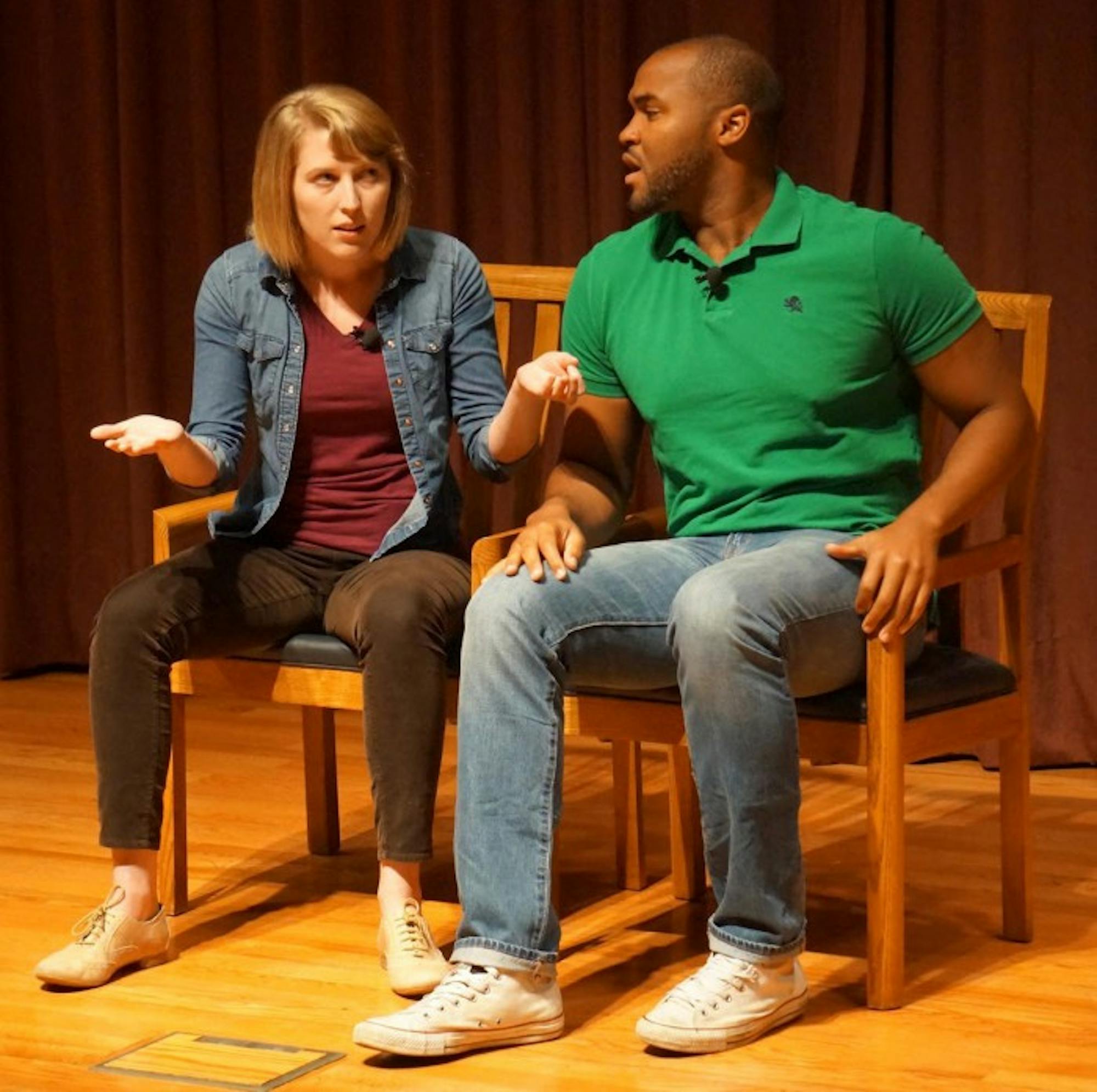Chicago-based Catharsis Productions came to campus and performed “Are You Getting the Signal?” on Wednesday night in DeBartolo Hall, combining scripted and improvised scenes with audience participation. The show used humor to provoke discussion about common misconceptions and misunderstandings surrounding sexual assault.
“Catharsis Productions was founded in 2000 when Christian Murphy and Gail Stern met at a one-act play festival and discovered they shared a passion for comedy, social justice and advocacy,” Maura Kinney, marketing and communications coordinator for Catharsis Productions, said in an email. “Our mission statement: To change the world by producing innovative, accessible and research-supported programming that challenges oppressive attitudes and shifts behavior.”

According to Regina Gesicki, assistant director of educational initiatives for Notre Dame’s Gender Relations Center, Christian Murphy is a 1992 graduate of Notre Dame. Murphy will also be on campus Oct. 12 to speak as part of Relationship Violence Awareness Month.
Murphy will “speak about his personal history and the journey from Notre Dame to founding Catharsis, a production company with such a unique way of working against interpersonal violence,” Gesicki said.
The show was performed by only two actors, Phillip Sheridan and Anne Dufault. The duo employed a medley of scripted material, audience suggestions and improvisation to enact a series of three scenes, each followed by open discussions among audience members.
“The scenes are used to illuminate some of the ridiculous aspects of the stereotypes we assign each other based on gender and sexuality and help everyone think about all the assumptions we connect to dating, consensual sex and rape,” Kinney said. “The goal is to really dive into the unique issues of each campus by talking to and engaging with students.”
During the first scene, Sheridan and Dufault narrated the thought processes of a man and woman at a party, highlighting how disinterest can be misinterpreted as "vibes." Audience members were asked to decide the direction of the scene by volunteering a pick-up line for Sheridan’s character to use, choosing whether Dufault’s character should be "nerdy" or "ditzy" and deciding whether Sheridan’s character should show his sensitive or "macho" side.
After the first scene, the actors led a discussion about the damaging impact of particular words society uses to describe sex, inequalities between genders and gender norms. The group analyzed conflicting cultural expectations for women to be passive and soft-spoken yet sexually confident, as well as pressures for men to be heterosexual, tough and emotionless womanizers.
During the second scene, audience members were given red cards reading "STOP." Whenever they thought the ensuing scene, depicting a stereotype-conforming man and woman at an off-campus party, became too embarrassing or difficult to watch, audience members held up their cards. The scene was followed by a discussion of the multiple aspects that made the depicted situation inappropriate.
“It is our feeling that sexual assault, and most forms of interpersonal violence, are manifestations of larger cultural issues, like racism, sexism, homophobia, etc.,” Kinney said. “Our programs attempt to get at the heart of those issues and encourage everyone to intervene at all levels when oppressive behavior emerges — from when someone makes a sexist joke to when someone is being creepy at a party.”
The actors stressed that sexual assault can take place along any gender dynamic and the importance of, and societal impediments to, bystander intervention.
The third and final scene consisted of a talk show discussing the blurred lines that can confuse the distinction between consent and rape. Dufault played the host, while Sheridan played a college boy defending himself against accusations of rape. The scene was followed by a discussion identifying various "red flags" in the defendant’s version of events.
“We use humor never as a way to make light of a serious issue, but as a way to illuminate the biases and hypocrisies of a culture where sexual assault is so prevalent,” Kinney said. “Through active participation and laughter, rather than lecturing, we find that our audiences are more engaged and motivated to step up and stop violence in their communities.”
An SOS advocate, a representative from the Rape Crisis Center of St. Joseph County, was sitting in the back of the auditorium in a private area outside of the performance room, available in case audience members became upset or distressed during the show.
Sheridan and Dufault ended the show by listing various local resources students can take advantage of in the case of sexual assault, including the counseling center in St. Liam Hall and the SOS Rape Crisis Center of St. Joseph County. They promoted support for victims of sexual assault, encouraging students to make sexual assault a more discussed and less victim-stigmatizing subject.
“What we can say to make a huge cultural shift is saying, ‘I support you, here’s a counseling center; I support you, here’s the phone number for a support group,'” Sheridan said.
“Here at Notre Dame, we are called to create a community where we honor the dignity of all and where we are our brothers’ and sisters’ keepers,” Gesicki said. “We should challenge one another to be active bystanders, to overcome our personal barriers to protect one another from harm. … I hope this year's production continues the robust campus conversation around sexual assault and violence prevention. I hope "Are You Getting the Signal?" encourages our community to continue to hold each other accountable and to change our culture to one where everyone does their part to show that violence is not tolerated.”













